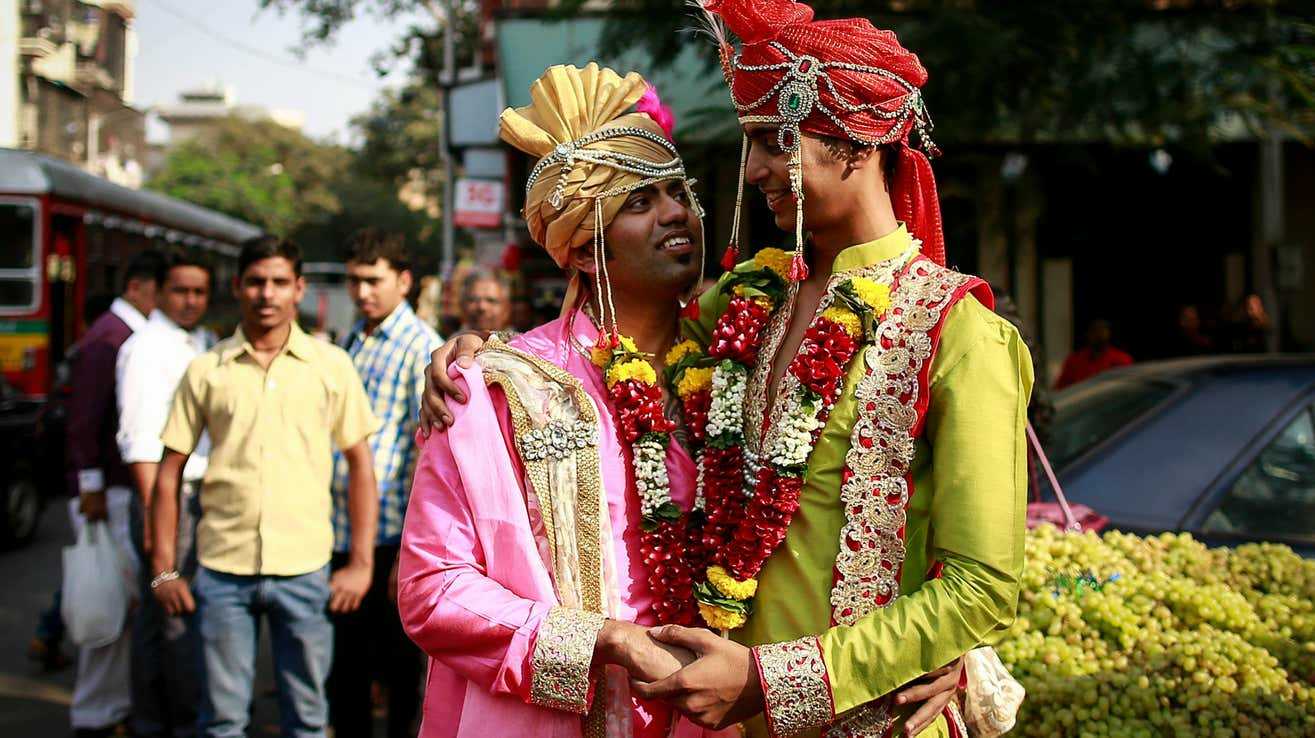
Indian Supreme Court bows down to the far-right, rejects same-sex marriage rights
By Staff Writer
The Supreme Court in India today (17) refused to grant legal recognition for queer marriages, in a landmark judgement, denying equal rights to tens of millions of people. A five-judge bench, led by Chief Justice of India (CJI) DY Chandrachud, ruled that the court could not “be re-drafting the law” or read down provisions of the Special Marriage Act due to institutional limitations. However, the CJI recorded the statement of the Solicitor General, appearing for the Union, that the Union Government would constitute a committee to decide the rights and entitlements of persons in queer unions.
Court urged the government to enact legal recognition of “same-sex relationships”, which the court was careful not to include under the institution of “marriage”.
The CJI decided as follows: “there is no universal conception of the institution of marriage and that it lies within the domain of parliament and state legislatures to enact laws recognising and regulating queer marriage”.
“This court cannot either strike down the constitutional validity of the Special Marriage Act or read words into the Special Marriage Act because of its institutional limitations.
“The court, in the exercise of the power of judicial review, must steer clear of matters, particularly those impinging on policy, which falls in the legislative domain”
Twenty petitions by same-sex couples, transgender individuals, and LGBTQIA+ activists challenged the Special Marriage Act 1954, Hindu Marriage Act 1955, and Foreign Marriage Act 1969, arguing they do not recognize non-heterosexual marriages, perpetuating discrimination against the LGBTQIA+ community. The bench clarified that the challenge would only be focused on the Special Marriage Act and not personal laws, including Hindu Marriage Act.
Justice S Ravindra Bhat opposed the judgement of the CJI and stated that an entitlement of legal union of marriage could only be through enacted law. He concluded that the Union shall set up a High Powered Committee to examine the rights and benefits to queer couples. Justice Bhat also held that the Court could not create a legal framework for queer couples and that it was for the legislature to do, as there were several aspects pertaining to policy to be taken into consideration.
Justice Hima Kohli concurred with Justice Bhat, agreeing with the CJI on the right of transgender persons in heterosexual relationships to marry as per existing laws. He also agreed that it would not be constitutionally permissible to recognize a right to civil union mirroring a marriage. On the aspect of the Central Adoption Resource Authority (CARA) regulations and the right of queer couples to adopt, he agreed with Justice Bhat’s view and stated that CARA Regulations could not be held as unconstitutional.
The Union government of Hindu supremacist Narendr Modi had consistently opposed gay marriages, calling them an “urban elitist concept”. In 2018, in a unanimous verdict in Navtej Singh Johar v Union of India, a Constitution Bench headed by Chief Justice Dipak Misra decriminalized consensual same-sex relationships and declared Section 377 as unconstitutional.
A group of 18 same-sex couples moved the country’s Supreme Court to legalize same-sex marriages in the country. They challenged the matrimonial laws in the country and claimed that same-sex couples are not given basic financial benefits, such as life and health insurance benefits or opening a joint bank account. The petitioners challenged the provisions of the Acts mentioned above to the extent these legislations do not recognize non-heterosexual marriages.
The hearing began on April 18, with advocate Dr Abhishekh Manu Singhvi stating that homosexual persons can no longer go to jail and the second step has to be affirmative, which is the recognition of their right to marriage. Mukul Rohatgi argued that the right to marry for non-heterosexual couples is implicit in Articles 14 (Equality), 15 (Non-Discrimination), 16 (Equality of Opportunity in Public Employment), 19 (Freedom of Speech), and 21 (Right to Life).
The petitioners primarily argued that because they can’t legally marry, they don’t have rights to inheritance, maintenance, tax benefits, and after their partner passes away, they can’t avail of benefits such as pension or compensation.
The Union government, the National Commission for Protection of Child Rights (NCPCR), and the Jamiat-Ulama-i-Hind have opposed petitions in the Supreme Court to legalize same-sex marriages in India. The Union government, NCPCR, and Jamiat-Ulama-i-Hind argued that Parliament is the proper forum for such matters and that a marriage can only take place between heterosexual men and women. The NCPCR also criticized the same-sex petitioners, arguing that they reflect urban elitist views. The Jamiat-Ulama-i-Hind argued that any law of this nature requires public discourse, both within and outside Parliament.
India has the world’s largest LGBTQ+ community, and this judgement (Supriyo@Supriya Chakraborty versus Union of India & Ors) gravely affects them. Given the long established practice of judicial activism of the Indian judiciary, which according to SP Sathe is recognized when a court gives a new meaning to statutory provision to suit the changing social or economic conditions or expanding the horizons of the rights of the individual, the current judicial restraint shows its increasing subjection to Hindutva supremacy and to far-right tendencies that wield sway under the Modi regime.
[Featured image courtesy of Reuters, Danish Siddiqui]

